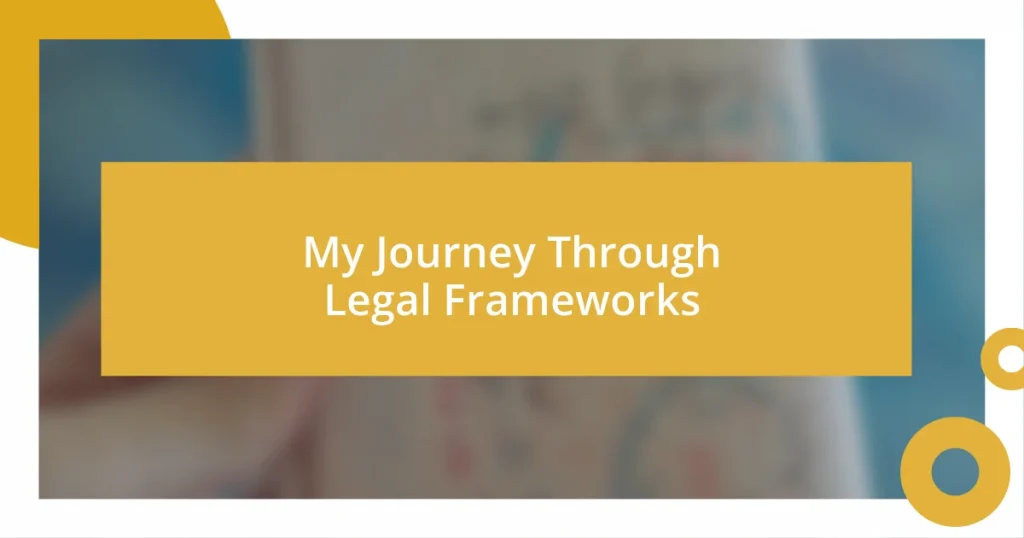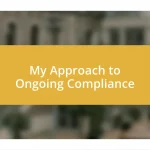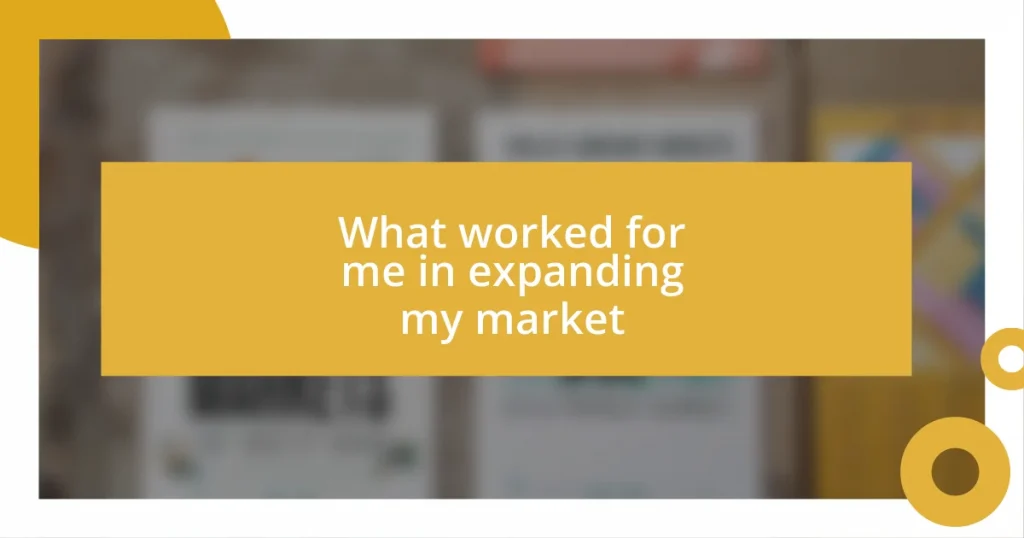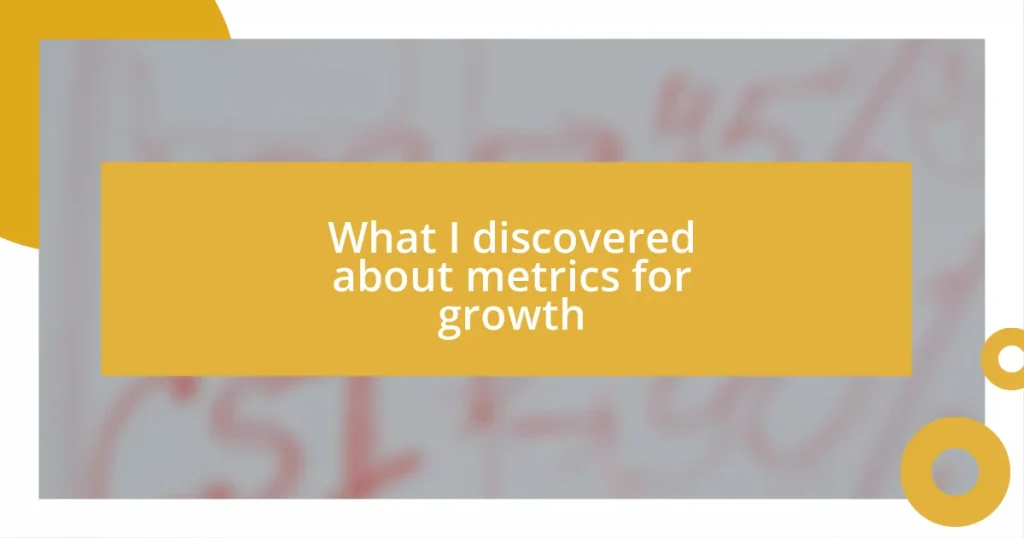Key takeaways:
- Legal frameworks are vital for conflict resolution, community trust, and adaptability, shaping society and guiding informed decision-making.
- Understanding key components like constitutional, statutory, regulatory, and case law is crucial for effective navigation of legal systems.
- Proactive engagement, organization, and continued learning through resources and networking significantly enhance legal compliance and understanding.

Understanding Legal Frameworks
Understanding legal frameworks can be quite a journey in itself. When I first delved into the complexities of laws and regulations, I realized that these frameworks are essentially the backbone of any society. Have you ever thought about how these structures shape our daily lives, often in ways we might not even notice?
Once, I found myself in a situation where I had to navigate a complex contract. That experience taught me that legal frameworks not only dictate rights and responsibilities but also guide us in making informed decisions. It was a bit overwhelming, but it underscored how critical it is to know what’s legally binding, especially when so much is at stake.
I often reflect on how legal frameworks are intertwined with culture and societal values. They aren’t just arbitrary rules; they embody what a society deems important. This realization has made me appreciate the nuances in legal systems around the world, and it raises an interesting question: how do our personal values align with the laws that govern us? Understanding these frameworks not only empowers us but also sparks deeper conversations about justice and community.
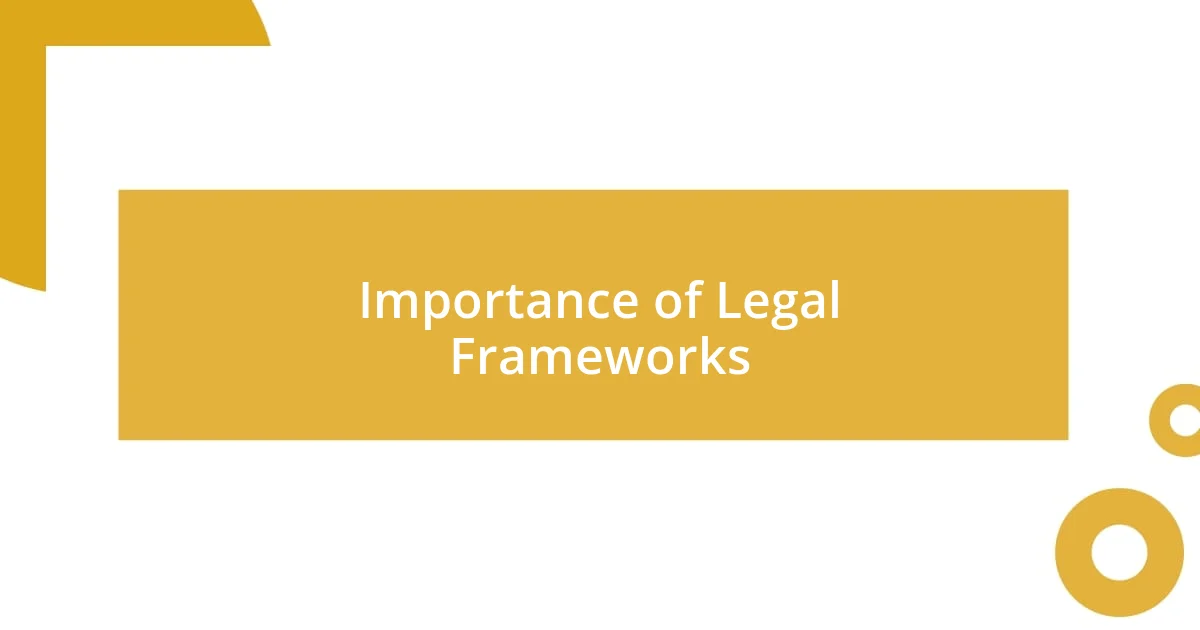
Importance of Legal Frameworks
Legal frameworks play a pivotal role in ensuring order and stability within society. I remember a time when a misunderstanding arose between a neighbor and me regarding property boundaries. Trust me, the moment I pulled out the local zoning laws, I experienced firsthand how crucial these frameworks are in resolving conflicts. They provide a clear path to resolution and protect our rights, making everyday interactions smoother and more predictable.
Beyond resolving disputes, legal frameworks also foster a sense of trust within communities. When I was involved in a public initiative to improve local parks, we relied heavily on zoning regulations to ensure that all voices were heard. It was enlightening to see how these laws not only guided our planning but also encouraged responsible civic engagement. They make it clear that everyone has a stake in community decisions, weaving a tapestry of cooperation and respect.
Lastly, I can’t stress enough how legal frameworks embrace change, enabling societies to evolve. I once attended a seminar on the adaptation of laws concerning digital privacy. It was fascinating to witness the discussions on how legal systems respond to emerging technologies. This adaptability reminds us that while laws may seem rigid, they are instruments of progress reflecting our values and aspirations. Isn’t it exciting to think how our legal frameworks can shape a better future?
| Aspect | Importance |
|---|---|
| Conflict Resolution | Provides clear guidelines for resolving disputes |
| Community Trust | Fosters a sense of responsibility and engagement |
| Adaptability | Allows legal systems to evolve with societal changes |
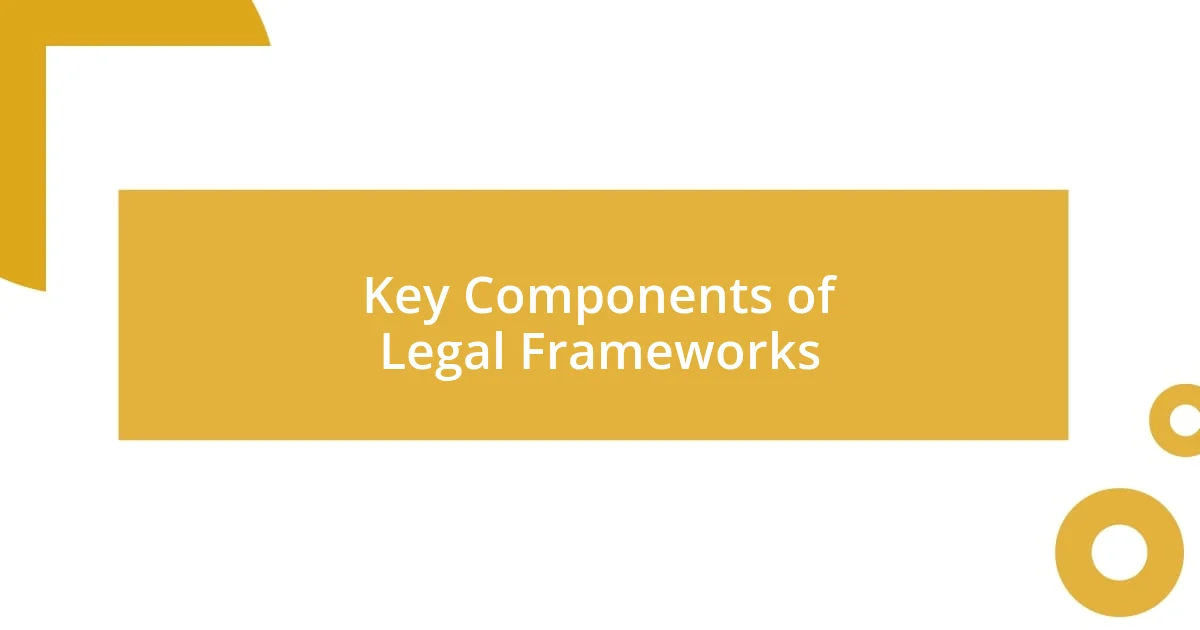
Key Components of Legal Frameworks
Legal frameworks consist of essential components that ensure they function effectively and serve society well. I recall my first experience with regulatory compliance during a workplace audit. Navigating those rules opened my eyes to the importance of regulations, which set the parameters within which individuals and organizations must operate, ensuring fairness and accountability. Each of these components contributes to a cohesive structure that supports law and order.
Key components of legal frameworks include:
- Constitutional Law: This serves as the foundation for all laws, outlining fundamental principles and rights.
- Statutory Law: These are laws enacted by legislatures that define specific legal standards.
- Regulatory Law: Often created by government agencies, these rules guide specific sectors, ensuring compliance.
- Case Law: Judicial decisions from previous cases inform and shape future legal interpretations.
- Administrative Law: This governs the activities of administrative agencies, providing insight into their regulations and procedures.
Reflecting on these components reminds me of my role in a community project where we had to consult various legal texts to ensure we were compliant with local regulations. I found it fascinating how these different types of laws interlink. Just like various instruments in a symphony, when they work together, they create harmony. This realization deepened my appreciation for the legal frameworks we often take for granted. Each component plays a crucial role, helping us navigate life’s complexities while protecting our rights and responsibilities.

Navigating Legal Regulations
Navigating legal regulations can initially feel overwhelming, especially when you’re faced with a complex sea of rules and guidelines. I vividly remember my first encounter with environmental regulations while planning a community garden. The pages of legal jargon seemed endless, and I often questioned whether we were doing everything right. But as I delved deeper, I realized that these regulations weren’t just bureaucratic hurdles; they were safeguards designed to protect our community and environment.
In my experience, proactive engagement with legal regulations tends to yield the best results. I once consulted an attorney while drafting a lease agreement, fully expecting a tedious process. However, that conversation opened my eyes to the nuances of tenant rights and responsibilities. The legal landscape became less of a maze and more of a roadmap that guided me toward clear, fair solutions. This transformation in perspective made me appreciate the importance of seeking guidance before jumping into legal decisions—don’t you think it’s always better to be informed than to learn the hard way?
I’ve also found that forming connections within the legal community can steer you through regulatory challenges. Joining a local business association opened doors to invaluable resources and networking. I encountered situations where hearing others’ experiences made the guidelines feel less intimidating. Their stories served as practical examples, illustrating how regulations apply in real-world scenarios. It’s fascinating how sharing knowledge can demystify something that initially seemed so complex, don’t you agree?

Challenges in Legal Compliance
Compliance with legal frameworks is far from straightforward; it often feels like trying to solve a puzzle without all the pieces. I remember a particularly challenging moment when I was tasked with ensuring compliance for a non-profit event. As I sifted through the myriad of local business and safety regulations, it became apparent how small oversights could lead to significant repercussions. That experience highlighted how even well-meaning organizations can inadvertently drift into non-compliance if they don’t have a clear understanding of the legal landscape.
Another challenge I encountered was the constant evolution of laws and regulations. There was a time when I overlooked a critical change in data protection laws that impacted my work. It felt overwhelming, like trying to keep up with a moving train. I thought, “How can one possibly stay updated on all these changes?” The reality is that businesses and individuals must make it a priority to continually educate themselves and adapt. I learned that having a compliance checklist and subscribing to industry updates could act as my personal early warning system.
Moreover, the financial strain associated with maintaining legal compliance can be daunting. A colleague once shared their experience of unexpected costs arising from compliance audits, which derailed their budget for the quarter. It made me realize how important it is to allocate resources effectively for legal guidance. So, I began advocating for a clear budget line in my planning for legal compliance activities, making sure I was never caught off guard again. Isn’t it curious how proactive measures can transform perceived burdens into manageable tasks?

Best Practices for Legal Navigation
I believe the first step in effectively navigating legal frameworks is to maintain an organized approach to documentation. When I started my small business, I quickly learned that keeping detailed records made all the difference during audits and inspections. A simple spreadsheet where I tracked contracts, permits, and correspondence not only provided clarity but also gave me peace of mind. Isn’t it reassuring to know that you have everything at your fingertips when you need it most?
Additionally, engaging with a mentor who has experience in the legal realm can be incredibly beneficial. I remember meeting someone who had spent years tackling legal issues in our industry. Their willingness to share insights and strategies for navigating common pitfalls saved me from making several costly mistakes. It’s like having a personal guide who’s already mapped out the terrain. Have you ever wished you had someone who could answer your legal questions just a phone call away? That’s what having a knowledgeable mentor can provide.
Lastly, I’ve found that utilizing technology can streamline legal navigation tremendously. Early on, I discovered software that helped me manage compliance deadlines and document submissions. This tool transformed my approach, minimizing the stress of keeping track of important dates. By automating reminders and organizing documents, I felt empowered rather than overwhelmed. How often do we underestimate the impact of technology in simplifying our challenges? Embracing the right tools can turn a daunting journey into a manageable endeavor.

Resources for Continued Learning
I’ve always found that reading books and articles on legal topics is a great way to bolster my understanding. One resource I treasure is a well-recommended legal handbook that covers everything from contract negotiation to intellectual property rights. I remember getting lost in its pages during a long weekend, and by the end, I felt not just informed but genuinely inspired to tackle even the trickiest of issues. Isn’t it fascinating how a single book can shift your perspective on complex legal matters?
Online platforms, like Coursera and edX, also offer courses taught by industry professionals, which can be incredibly useful. I took a short course on compliance last year, and it opened my eyes to concepts I had previously overlooked. Engaging with interactive content and real-life case studies made the learning process enjoyable and applicable to my work. Have you ever considered how a structured online class could propel your understanding further than just casual reading?
Networking with legal professionals can be another valuable avenue for continued learning. I still recall my first legal networking event; I was nervous but came away with connections that have proven invaluable over time. Exchanging experiences and advice with others in the field can provide insights that textbooks simply cannot. Isn’t it interesting how the conversation can sometimes lead to the most enlightening lessons?










